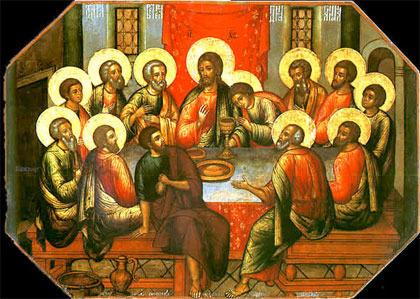"I have eagerly desired to eat this Passover with you before I suffer"
... With these words Jesus began the celebration of his final meal and the institution of the Holy Eucharist. Jesus approached that hour with eager desire. In his heart he awaited the moment when he would give himself to his own under the appearance of bread and wine. He awaited that moment which would in some sense be the true messianic wedding feast: when he would transform the gifts of this world and become one with his own, so as to transform them and thus inaugurate the transformation of the world.
In this eager desire of Jesus we can recognize the desire of God himself – his expectant love for mankind,  for his creation. A love which awaits the moment of union, a love which wants to draw mankind to itself and thereby fulfil the desire of all creation, for creation eagerly awaits the revelation of the children of God (cf. Rom 8:19).
for his creation. A love which awaits the moment of union, a love which wants to draw mankind to itself and thereby fulfil the desire of all creation, for creation eagerly awaits the revelation of the children of God (cf. Rom 8:19).
Jesus desires us, he awaits us. But what about ourselves? Do we really desire him? Are we anxious to meet him? Do we desire to encounter him, to become one with him, to receive the gifts he offers us in the Holy Eucharist? Or are we indifferent, distracted, busy about other things? From Jesus' banquet parables we realize that he knows all about empty places at table, invitations refused, lack of interest in him and his closeness. For us, the empty places at the table of the Lord's wedding feast, whether excusable or not, are no longer a parable but a reality, in those very countries to which he had revealed his closeness in a special way.
Jesus also knew about guests who come to the banquet without being robed in the wedding garment – they come not to rejoice in his presence but merely out of habit, since their hearts are elsewhere. In one of his homilies Saint Gregory the Great asks: Who are these people who enter without the wedding garment? What is this garment and how does one acquire it? He replies that those who are invited and enter do in some way have faith. It is faith which opens the door to them. But they lack the wedding garment of love. Those who do not live their faith as love are not ready for the banquet and are cast out. Eucharistic communion requires faith, but faith requires love; otherwise, even as faith, it is dead.
From all four Gospels we know that Jesus' final meal before his passion was also a teaching moment. Once again, Jesus urgently set forth the heart of his message. Word and sacrament, message and gift are inseparably linked. Yet at his final meal, more than anything else, Jesus prayed. Matthew, Mark and Luke use two words in describing Jesus' prayer at the culmination of the meal: "eucharístesas" and "eulógesas" – the verbs "to give thanks" and "to bless". The upward movement of thanking and the downward movement of blessing go together. The words of transubstantiation are part of this prayer of Jesus. They are themselves words of prayer. Jesus turns his suffering into prayer, into an offering to the Father for the sake of mankind. This transformation of his suffering into love has the power to transform the gifts in which he now gives himself. He gives those gifts to us, so that we, and our world, may be transformed.
The ultimate purpose of Eucharistic transformation is our own transformation in communion with Christ. The Eucharist is directed to the new man, the new world, which can only come about from God, through the ministry of God's Servant.
Read the rest of Pope Benedict XVI's homily at the Mass of the Lord's Supper, Holy Thursday.
Carl E. Olson's Blog
- Carl E. Olson's profile
- 20 followers



